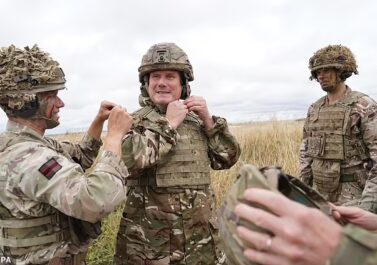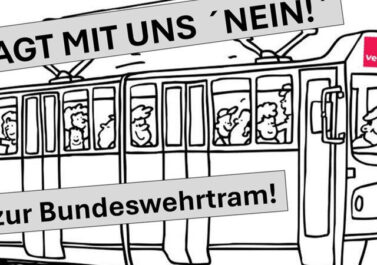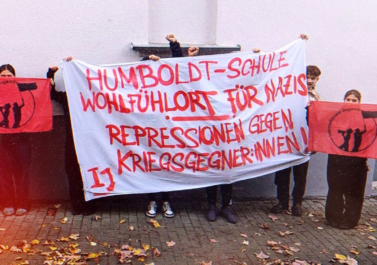
We translated this text by dear comrades from France on the current process of militarisation under the Macron government. The original article can be found here. In the UK both Tories and Labour compete over who can inflate the military budget more efficiently. We encourage you to read the 15 theses on a new anti-imperialism by comrades from Germany for wider context.
War was an indispensable part of capitalist development, before having become one of its diseases [1]. In its prime, it was still a question of exporting European antagonisms to other continents. In quick succession, two world wars brought it back to the heart of the old historic centre and brought the cycle full circle. Are we on the verge of a new one?
Several recent events bear witness to sharp tensions between imperialist powers. However, the Cold War is definitely behind us and it would be risky to draw up a pre-fixed scenario for the present time, as so many alliances are being forged and unravelled at the pace of a crisis punctuated by theatrical coups as it deepens. One thing is certain: the holy alliance of industrialists, politicians and the military remains as relevant as ever. All the more so when, simultaneously or in turn, they sniff out an opportunity to seize. And at the moment, that seems to be what it’s all about.
Macron’s war economy
Who still remembers Montebourg [2] and his “Redressement Productif”? [3] The ‘Start-up Nation’ also seems to have fallen by the wayside. This is hardly surprising given Macron’s performance speech at Eurosatory, which de facto launched France into a “war economy” [4]. Martial, if there is such a thing, is the compelling phrase of the day. But what reality and what issues are hidden behind it?
The commonly accepted definition of a “war economy” is that of a state that uses planning to redirect the production of its industries in order to win a military victory. The result is an increase in fiscal pressure and money creation, inflation and public debt. In other words, the perfect combination of everything that the current government team claims it wants to combat head on.
In truth, the challenge facing all political majorities remains the crisis of extended reproduction that has been undermining the globalised capitalist economy for several decades. It is characterised by manufacturing overcapacity, falling industrial employment, saturated markets and falling rates of investment in fixed capital [5].
Chained to the logic of profit, politicians and tycoons have so far done nothing that has not exacerbated the antagonisms between rival zones of influence: the development of finance and the repeated bursting of bubbles; the massive transfer of labour to the service sector, a weak engine of growth and a generator of low-skilled, low-paid jobs; rising international tensions and a resurgence of protectionism…
The quest for the industrial Holy Grail
Given this situation, reindustrialisation has become the mantra of some decision-makers, particularly in France. For example, there is a fraction of the French employers that has been waiting for its opportunity within the employers’ association MEDEF. This fraction is represented by the metal sector employers’ organisation UIMM [6], whose president is none other than the CEO of the arms manufacturer Dassault. This fraction has welcomed the current geopolitical climate as a godsend. First of all, it sees it as an opportunity to restore its image and get back on track after years of tarnishing its image and the revelation of sensitive business deals [7] that are veritable secrets of Polichinelle [8] …
Above all, it can claim to be the driving force behind the government’s plan to modernise not just the military, but the industrial sector as a whole. And so the trick is done, and the military industry finds itself the instigator of a fantasised re-industrialisation. To bolster his position, the head of the UIMM points to France’s second place behind of Putin’s Russia in world arms sales (the 3rd place if we take the US into account – the translator). It’s true that since the war in Ukraine, the stock market value of military equipment manufacturers in all categories has risen by more than 35%.
Although the industry now accounts for just 10% of France’s GDP, the arms industry has just posted sales of €30 billion, including €10 billion from exports. Compared with the 2,096 billion that the entire German manufacturing industry accumulated in 2020, this seems a rather puny amount [9]. But it is also a question of balance, or rather imbalance, within the “Franco-German couple” and the EU. France’s stated desire to build a Europe of Defence can only be understood in terms of the benefits that still elude it in a market from which it derives one of its main sources of income. By way of example, the EU spends 60 billion on military aircrafts from UK-based Lockheed Martin, the Polish buy their equipment from the Koreans and the Germans continue to take their instructions from Washington (meaning, even within the EU France could have a bigger market share in terms of arms exports – the translator). A return on investment that is all the more eagerly awaited by the UIMM as it pays out more than 400,000 Euros each year to obtain the benevolent ear of the European Commission.
Rolling out the red carpet for employers
On the eve of the First World War, R. Luxemburg stated that for the capitalist class militarism had become indispensable from three points of view: “1. to defend national interests, (…) 2. to constitute a privileged field of investment for both financial and industrial capital (…) 3. to ensure its class domination over the working people…”.
On reading the 2022 issue of the Revue Nationale Stratégique [10], one finds that none of these three points is missing from the programme, and is particularly represented by the new Délégué Général pour l’Armement (General Delegate for Armenments) [11], Emmanuel Chiva, a businessman, senior civil servant and reserve officer all rolled into one.
There is nothing really new in the defence of national interests. Surveillance and the development of cyber security are on the agenda, but it is above all the partnerships between governments associated with arms sales that interest the State. These contracts enable it to maintain its strategic positions on the international stage, as well as its status as a “balancing power”.
The second point on the roadmap is of greater interest. “Putting production capacity back at the heart of our concerns”, by producing more, faster and, above all, more cheaply, means simplifying and optimising our (French) industrial facilities. The aim is to “reduce the level of requirements by 20% in order to simplify the work”. Due to less scrutiny, the government is assuming that it will share the risks with the employers, i.e. that it will support them in the event of a problem.
We can already measure the extent to which this programme will undermine the safety and working conditions in the sectors concerned. Macron and his cohorts are insisting on the need to involve in the project the thousands of small and medium enterprises that already work in both the civilian and military sectors. Using “dual companies” is an old practice, and the nuclear industry remains a textbook case in France. In this case, the innovations and spin-offs are expected to come mainly from high-tech, high value-added products. Killing two birds with one stone…
Finally, after the workers, it will be the turn of young people, with priority given to those from working-class backgrounds. They will become raw material to be formed through work, discipline and ideology. A DGA (Direction générale de l’armement, state board for armament) official told the press that the defence industry is essential to put “people behind the machines”. To achieve this, he intends to “communicate with young people” in order to recruit a certain number of them for jobs as welders or mechanical fitters, which are in high demand from industry. The Ministry of Defence will soon be taking steps in this direction with the Ministry of Education.
In turn, schools will be asked to contribute to promoting the SNU (Service National Universel, national service) and working to “strengthen and entrench as early as possible the spirit of defence in young people and the attractiveness of the profession of arms, in order to build a foundation of collective resilience”.
Where will the money come from?
As the saying goes, paper never refuses ink, and the pen of the state ministries that sign arms contracts for the industry moves rather slowly … First and foremost, the state must ensure the financing of this scenario. The 413 billion announced will not be enough and the banks will look twice before committing themselves.
Concerned about their image, they could lose access to reduced-rate financing if they suddenly began to invest heavily in arms production and trade. For the time being, the taxonomy [12] applied by the European Investment Bank will prevent them from doing so, unless it too changes its tune under pressure from the Member States. We recently learned that the French Ministry of Defence is working on setting up a network of banking advisers in France and across Europe…
There is, of course, the European financial market, in particular Euronext, where the share price of arms manufacturers has doubled under the combined effect of the war in Ukraine and Trump’s threats. In the event of his re-election, Trump has announced that he will withdraw financial support from Europe if certain member states do not increase their subsidies to NATO…
Of course, there is also the 2,500 billion euros in French savers’ wallets, which the government is covetously eyeing up.
Last but not least, the public deficit, skilfully maintained by the unlimited drawing rights granted to employers, will lead to further juicy budget cuts at the expense of health, culture and social protection. There can be no doubt that the huge sums thus generated will find buyers among the prince’s favourites…
And now
The possibility of war should never be taken lightly. For capitalism, war has a precise function: to destroy excess capital and relaunch a new cycle of accumulation. For all that, we must be wary of stating categorically, as some do, that we are on the eve of a new global explosion.
We need to redouble our vigilance and oppose all forms of recruitment to the new militarism. To do this, we must fight all patriotic, nationalist, militarist and imperialist rhetoric, wherever it comes from and without exception. The rejection of the SNU and state propaganda aimed at young people, the fight against budget cuts in vital sectors of society and, above all, the daily class struggle against employers and capital are the only weapons we have, and it’s up to us to use them wisely.
Boulogne-sur-mer, 14/04/2024
————————————–
Footnotes
1. It is never a bad idea to revisit the classics. R. Luxemburg’s main texts on militarism and imperialism still provide an enlightening perspective on the question today.
2. Arnaud Montebourg – Wikipedia
4. Eurosatory is an international trade fair held every two years in Paris, bringing together the leading arms manufacturers.
5. “Karl Marx à Pékin”, the book by Mylène Gaulard, published in 2014, offers an overview whose conclusions on “The dangers of over-accumulation in China” – and beyond – have since been confirmed.
6. Union des Industries et Métiers de Métallurgie (UIMM). The French metallurgy employers’ association needs no introduction, and there is a wealth of literature on the subject.
7. The 2007 affair around undeclared funds and bank accounts is just one in a long line of incidents in its history.
8. Polichinelle | World Encyclopedia of Puppetry Arts (unima.org)
9. Germany’s GDP: 4,500 billion in 2020. France’s GDP: 2,304 billion in 2020.
10. Direction générale de l’armement – Wikipedia
11. Document available on the website of the General Secretariat for Defence and National Security.
12. Taxonomy: originally a branch of natural science hijacked to green certain banking and/or production practices.



